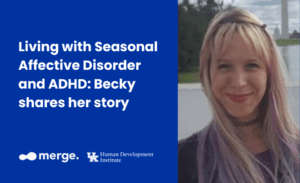When Dr. Rachel Womack attended the Disability Policy Seminar, she wasn’t entirely sure what was in store for her.
Womack, who serves as HDI’s Training Director, had been to academic conferences before, but policy seminars were a new experience – and one she enjoyed.
“It wasn’t just sharing information, it was sharing, ‘Hey, here’s the relevant information and here’s what you can do with it,’” she said. “It was learning the valuable skill of how do we affect change at a policy level through education.”
The seminar was geared towards not only professionals, but also self-advocates and family members.
The first couple days were dedicated to identifying the biggest issues in the disability community right now, which Womack said included employment, home and community-based services, Medicaid waiver programs, housing inclusive education, and the Autism CARES Act. They also learned how to advocate and educate without directly lobbying.
“What we’re doing when we lobby is we are telling a lawmaker whether they should be in favor of or against a specific policy,” Womack said. “When we educate…what we can do is we can talk about just broadly, the importance of policies.”
She used the Autism CARES Act as an example, stating that, while she could not advocate for or against its reauthorization, she could talk about the importance of funding for autism research and training efforts in general.
On the third day, attendees took to Capitol Hill to meet with their local lawmakers and put all the skills they’d learned to use. Womack traveled with LEND trainee Hannah Keene and teamed up with other members of Kentucky’s disability community to speak with lawmakers about the issues of the day and how they could affect Kentuckians with disabilities.
“There was no discussion at all of a specific policy, but what we explained is that people with disabilities in Kentucky and across the nation want to work,” Womack said. “They can work. They can contribute very valuable things to the workforce. We talked about the difference between, things like sheltered workshops and, integrated competitive employment settings and kind of the impact that being in one of those environments versus the other can have on someone’s life.”
It was Womack’s first time attending the Disability Policy Seminar. But she doubts it’ll be the last.
“There are not enough spaces where professionals, students, self-advocates and family members can come together for one cause,” Womack said. “The tools that folks gain at events like the Disability Policy Seminar are so important because they’re so useful. It’s not something where we just go home and we say, ‘Hey, I learned this really interesting thing today.’ It’s, ‘Oh, I go home and now I know how to affect change, in the political arena because I’ve learned how to do that appropriately.”



